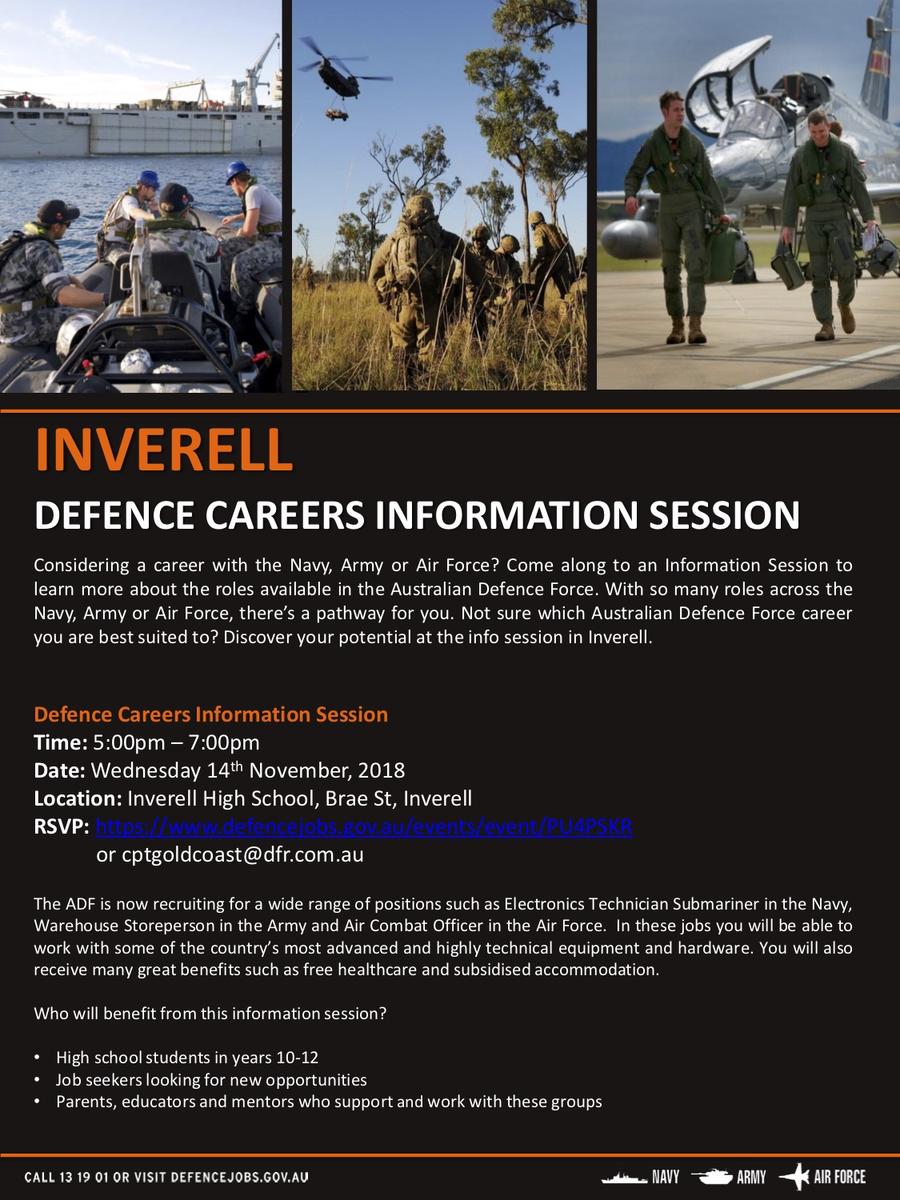SECONDARY NEWS
From the Assistant Principal

SECONDARY NEWS
From the Assistant Principal
The Holy Trinity Cattle Show Team will compete at the Northern Schools Steer Competition on Wednesday 14 and Thursday 15 November 2018 at the Inverell Showground. It is a great show for both experienced and inexperienced students. Students have been attending training after school in preparation for the show. Good luck to Mrs Townsend and the Show Team.
The Defence Force will be holding a Careers Information Session from 5.00pm - 7.00pm on Wednesday 14 November at Inverell High.
The ADF is recruiting for a wide range of positions and attending the session will provide you with more information about possible opportunities within the Defence Force.


Students are reminded that semester exams will be held in Week 5 for Year 10 from Wednesday to Friday and in Week 6 for Years 7 - 9. Year 9 will also be doing Elective exams on Friday of Week 5. In order for students to achieve their best possible results, it is necessary to prepare adequately for these important assessments. Students are encouraged to revise thoroughly in the coming weeks and to seek assistance from their teachers if required. It is essential that students catch up on missed work if they have been absent from school.
What do you do if you have left your study to the last minute?
In an ideal world it would be great if all students paid attention, focused and participated in all classes, completed all homework and assessments thoroughly, asked for help throughout the year on anything they didn’t understand, made regular summaries of the work covered in class (preferably at the end of each topic or section) and did their best to learn as they go throughout the year.
But in reality, this doesn’t always happen for every student and every subject.
So what can you do if you have left your study for tests and exams to the last minute?
5 TIPS FOR LAST MINUTE STUDY
FIND OUT FAST: Be very clear what you need to learn and what will be tested. It is impossible to start your study until you are sure what you have to know. Find out as much as you can too about the exam format and the style of questions. Don’t be afraid to ask your teacher. For each subject write a list of exactly what topics and areas you need to review.
GATHER MATERIALS: Do you have notes, materials, textbooks on everything you need to learn? If not, is there a friend who will let you photocopy the work you have misplaced? Is there an online portal where material from classes is stored? Can you borrow from the library additional books or textbooks on the topics you need to learn? Are past examination papers available?
MAKE A PLAN: You only have limited time left so you need to make the most of it. Draw up a grid that shows how much time you have left before your exams to study. Decide if you will spend equal time on each subject or if certain subjects need more time. Allocate subjects to the timeslots you have then decide exactly what you will do to prepare for each subject. For each subject make a list of what sort of study you should do to prepare for that subject. Brainstorm your ideas on how to prepare, ask your parents and teachers for feedback and share ideas with your friends.
CREATE STUDY NOTES: Target your notes to what will be tested. It is best for learning and memory to make your study notes yourself, but if you have run out of time there are options. See if any of your class materials or textbooks have summarised the sections you need, see if there are study guides available in the library on the topics to learn or make targeted notes yourself on the key areas you have to memorise. You could also see if there is a friend where you could split the topics between yourself and share the notes you make. Don’t spend too long on this stage, it needs to be completed as quickly as possible.
STUDY! What does study actually mean? It means memorising the material you need to know so you can recall it in the exams, and practising the skills of the subject so you know how to do the types of questions you will have in the exam. To memorise your notes you need to test yourself over and over on them. You could read a section, see what you can write down without looking then check. Then review the things you didn’t know again. Or you could do the same approach reading things out loud then seeing what you can repeat out loud. Doing questions, practise essays, past exam questions will also help you understand what you know, and what you need to spend more time on.
The key is to get started. No more procrastination, no more excuses. Start today!
For many students, a block of examinations can be daunting. Some students have no idea where to start and what they should work on.
The first thing to do if you have examinations approaching in the next few months is to find out what topics will be tested. Even a simple question to teachers can get you started such as ‘are we being tested on the whole year’s work or just this semester?’.
Once you know what topics will be covered, organise all of your learning materials and make sure nothing is missing and you have everything you need to review those topics.
The next step is to make study notes on these topics if you haven’t been doing this throughout the year (hopefully you have!).
Next, it is time to start learning the notes (testing yourself on them over and over) and doing practice questions to make sure you can apply your knowledge to different types of questions.
If you have a number of weeks prior to the examinations, it is a good idea to make a plan in your diary or phone or on a whiteboard of what subjects you will study when.
Try and allocate each subject once or twice each week, depending on the number of examinations you have.
This event has been designed to give young people the opportunity to build their knowledge and understanding of the beef industry, in a safe and welcoming environment. Activities will target all age groups and experience levels, and the committee will be available to help you. The organisers have placed a strong focus on ensuring that the demonstrations are age appropriate and that practical skills and knowledge will be able to be taken away from the event. For those that don't have access to a suitable Hereford animal, crossbred steers may be shown as long as they are 50% Hereford, if that is still not an option there will be loan animals available. Simply select ‘Loan Animal required’ in the entry form and leave the rest to the organisers.
If you are interested in attending please contact Mrs Kathy Townsend in Secondary for entry forms.
The flyer attached below also contains more information about the camp.